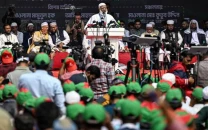Talking to the Afghan Taliban
The flip-flop policy of the Americans demonstrates how ignorant they are of the region.

The writer is a consulting editor with The Statesman and writes widely for several newspapers in India
Significantly, given the emotional and angry reaction by Afghan President Hamid Karzai to being kept outside the proposed dialogue with the Taliban widely perceived to be brokered by Pakistan, Mr Khurshid’s assertion that “the peace initiative should be Afghanistan-owned and Afghanistan-driven” acquires new meaning. Mr Karzai, objecting to the Taliban suggestion to name the Doha office as the “Islamic Emirate of Afghanistan”, alongside the national flag, has refused to be calmed down by US officials and snapped talks on bilateral security arrangements.
The talks have been on for a while now, with source-based reports in The Express Tribune confirming the role played by Pakistan in bringing the US and the Taliban closer to a peace accord. A worried President Karzai, who has made two visits to India in less than six months, has been clearly seeking New Delhi’s support for his position that the opening of the office and talks with the Taliban and other parties should go through his government and not through Islamabad. President Karzai has been left out of the process, with the US also showing signs of dropping him from the peace process as an “irritant” that has met with a fair degree of success after Islamabad’s decision to use its clout with the Taliban.
Both India and President Karzai have not been happy with the outcome, although the Manmohan Singh government remained silent, at least publicly, on the secret negotiations. Instead of working together, both India and Pakistan have been working against each other in Afghanistan. While there is recognition here in Delhi that the ongoing effort is to avoid a civil war in Pakistan after the US pullout, there is also worry that the “deal” might give the Taliban excessive influence in the new set-up, returning the region to a status quo after years of violence.
Iran, Russia and India are amongst the stakeholders that are opposed to a re-entry of the Taliban in mainstream politics, per se. In recent weeks, the Taliban have been working to dilute the opposition from Iran, with visits by delegations to Tehran, which was virtually unheard of in the past. There is growing recognition that given the mess in Afghanistan, lasting peace cannot return without involving the Taliban. But New Delhi that remains averse to this, can now wag a “we told you so” finger after the recent controversy over the naming of the Taliban office and the tough stance adopted by them in the negotiations with the US and Pakistan.
Interestingly, New Delhi, despite this worry, has been keeping a strange silence on the events. Mr Khurshid’s recent remarks from Baghdad are guarded, with several former diplomats of the view that the UPA government needs to speak out on the issue, otherwise, it will be faced with the fait accompli of a Pakistan-backed Taliban government in Kabul.
The flip-flop policy of the Americans demonstrates how ignorant they are of the region and how totally unaware they are of the complexities and the dynamics that control the countries they have made their battleground. The tragedy of human suffering over the last decade, and more, will be further compounded if the pullout of troops creates an unmanageable crisis, bringing violence instead of peace to the troubled region.
Published in The Express Tribune, June 24th, 2013.
Like Opinion & Editorial on Facebook, follow @ETOpEd on Twitter to receive all updates on all our daily pieces.



















COMMENTS
Comments are moderated and generally will be posted if they are on-topic and not abusive.
For more information, please see our Comments FAQ